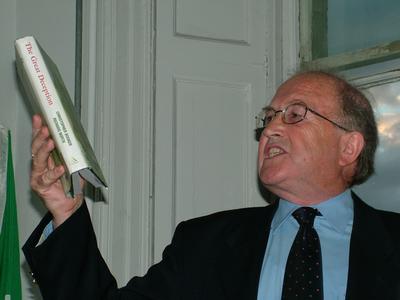EU dimension to castle talks
Speaking at the 2004 Desmond Greaves Summer School in Dublin, leading Irish Eurocritic Anthony Coughland said:
"THE ANGLO-IRISH talks in Leeds Castle on the Good Friday Agreement have a political connection with the proposed European Union constitution.

"This is because the three biggest political parties in the north - the DUP, UUP and Sinn Fein - are opposed to the constitution, so that it is probable that most northern voters will vote No when it comes to the UK referendum on it.
"It is possible also - indeed probable - that the UK as a whole will vote against the constitution in that referendum.
"Whether one supports the idea of an EU constitution or not, it seems to make every sense therefore for the Irish government to postpone the Republic's constitutional referendum until after our fellow-countrymen in the north have cast their votes, and we know whether the UK as a whole will accept or reject it.
"For the South to have its referendum first would expose us to the danger of repeating what we did in relation to the euro-currency, when we joined the eurozone on the assumption that the UK would join it also within a couple of years, but we then found that it did not. That has given a new dimension to the north-south border and has left us in the position of using the currency of an area with which we do only one-third of our trade.
"For the south to seek to put itself under the jurisdiction of an EU Constitution while the North stayed with Britain outside it, would add a profound new dimension to Partition at a time when north and south should be coming closer together, as envisaged in the Good Friday agreement.
"It would surely be sensible of the Irish government to do the same as the Danish government: wait until after the UK referendum before holding our next EU referendum.
"It looks as if the Danish government will take this course because it hopes that if the UK says Yes to the constitution, the Danish people will say Yes also and agree simultaneously to abolishing Denmark's legal opt-outs from the euro, EU citizenship and EU military matters.
"On the other hand, if the UK rejects the Constitution, it will be impossible to get the Danish people to say Yes to it; so there would be no point in holding a Danish referendum anyway.
Having built up such a bank of goodwill in Brussels for its success in getting the Constitution agreed during Ireland's EU presidency, Mr Bertie Ahern's Government need not fear incurring opprobrium among its European Union partners by saying that Ireland's rather than EU interests should determine the timing of the Irish constitutional referendum, and that it is in our genuine national interest to wait to see how the North and Britain vote first.
"Irish supporters and opponents of the EU constitution should be able to agree on the common sense of that, as being in accordance with the country's real national interests.
"How can our unionist fellow-countrymen in the north be expected to take seriously Dublin's statements about seeking closer north-south cooperation, if Dublin decides the timing of its referendum on the EU constitution as if northern concerns and attitudes did not matter?
"The ratification politics of the EU constitution could well confront us with serious policy dilemmas in the next few years.
"If the UK votes No to the constitution and the Franco-German-led states push ahead with closer EU integration,whether based on "The Treaty Establishing a Constitution for Europe", which will be signed in Rome on 20 October, or some variant of that, Britain and the north could well find themselves before long in a semi-detached associate relation with the EU, rather than full members of it. What would the Republic's policy be then? This is something we may have to start thinking about before long.
"One way or another,therefore,it surely makes every sense not to hold a referendum in the south to accept the primacy of a European Union constitution over the Irish constitution until after Britain and the six counties have voted on it first."
Connolly Association, c/o RMT, Unity House, 39 Chalton Street, London, NW1 1JD
Copyright © 2004 Connolly Publications Ltd

